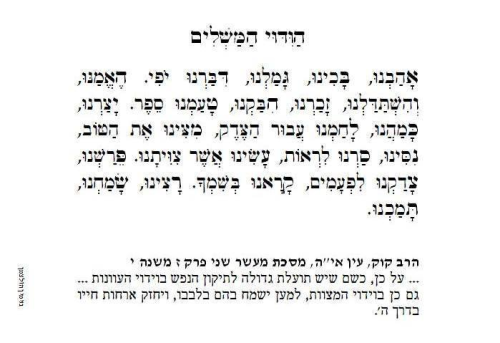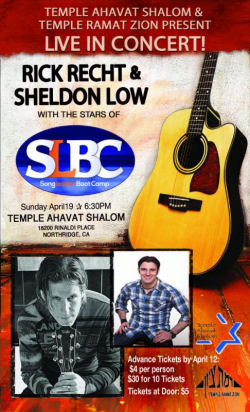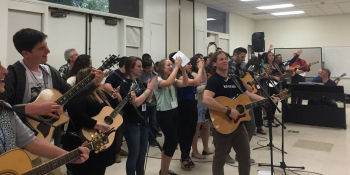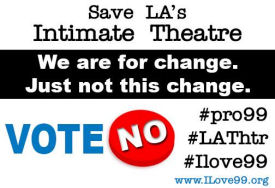 Recently, over on Facebook, I’ve gotten into a discussion with some of my more devout friends about the recent court case in Oregon. You may be familiar with it: This is the case where the former owners of an Oregon bakery have been ordered to pay $135,000 to a lesbian couple who were refused a wedding cake. The large amount was for pain and emotional distress. The bakers had cited their Christian beliefs against same-sex marriage in refusing to make the wedding cake for the lesbian couple. The court decision was based on the fact that Oregon law bars businesses from discriminating or refusing service based on sexual orientation, just as they cannot turn away customers because of race, sex, disability, age or religion.
Recently, over on Facebook, I’ve gotten into a discussion with some of my more devout friends about the recent court case in Oregon. You may be familiar with it: This is the case where the former owners of an Oregon bakery have been ordered to pay $135,000 to a lesbian couple who were refused a wedding cake. The large amount was for pain and emotional distress. The bakers had cited their Christian beliefs against same-sex marriage in refusing to make the wedding cake for the lesbian couple. The court decision was based on the fact that Oregon law bars businesses from discriminating or refusing service based on sexual orientation, just as they cannot turn away customers because of race, sex, disability, age or religion.
The discussions on Facebook at times has been heated. To many of my devout friends (by that I mean folks who hold strong scriptural Christian views as well as Orthodox Jewish friends), this is a case of the courts impinging on the freedom to practice their religion, or upon their freedom of speech. To many of my more liberal friends, this is a case of Oregon simply enforcing their anti-discrimination laws. The whole recent issue of same-sex marriage has highlighted the tension that exists between these three legal concepts, and Facebook discussions do not easily permit a suitable exploration of the issues. As this issue is swirling in my head, I request your indulgence to do so here.
Lets start by looking at some constitutional amendments:
- First Amendment. Congress shall make no law respecting an establishment of religion, or prohibiting the free exercise thereof; or abridging the freedom of speech, or of the press; or the right of the people peaceably to assemble, and to petition the Government for a redress of grievances.
- Fourteenth Amendment. Section 1. No State shall make or enforce any law which shall abridge the privileges or immunities of citizens of the United States; nor shall any State deprive any person of life, liberty, or property, without due process of law; nor deny to any person within its jurisdiction the equal protection of the laws.
Next, there’s the Oregon law:
- 659A.403 Discrimination in place of public accommodation prohibited. (1) Except as provided in subsection (2) of this section, all persons within the jurisdiction of this state are entitled to the full and equal accommodations, advantages, facilities and privileges of any place of public accommodation, without any distinction, discrimination or restriction on account of race, color, religion, sex, sexual orientation, national origin, marital status or age if the individual is 18 years of age or older. [A public accommodation is defined to include “Any place or service offering to the public accommodations, advantages, facilities or privileges whether in the nature of goods, services, lodgings, amusements, transportation or otherwise.” but to exclude “An institution, bona fide club or place of accommodation that is in its nature distinctly private”]
Let’s start by exploring whether baking a cake is an exercise of religion. To my interpretation, free exercise of religion is a personal matter. What I wear. What I worship. How I worship. My ability to do that exercise stops at the point where it starts to infringe on someone else’s exercise or beliefs. Same sex marriage is actually a good example of this: Some believe it is not within their religion, others believe that it is. Within my church, I don’t have to do such marriages; I should not be able to prevent those that believe in it from doing it. To do so would be to impinge on their free exercise of religion. In the case of a public business refusing to bake a cake, even with a message on it, that’s impacting someone else. It is not preventing me from going to my church, worshiping my deity. It is trying to impose my view of what is proper, based on my religion, upon someone else. As I’ve said before: My freedom to exercise my religion stops when it impinges on someone else ability to follow their beliefs.
Here’s another way to look at it: In general, my religion should not care what the heathens do; my religion should only care about what I do and what I need to be a good and righteous person/get into [Heaven-concept]. Imposing my religious morality upon the heathen is imposing my religion upon the heathen, and preventing their ability to freely exercise their heathen religions (damned that they may be for doing it). [Unfortunately, the Christian majority in this country far too often wants to do just that to us “heathens” (non-Christians), and the first amendment exists to make it clear that they can’t]
What about freedom of speech? After all, what is on a cake is a message. Perhaps the producer of the cake didn’t want to deliver the message. This would be similar to a private publisher refusing to publish a letter to the editor because they did not want to appear to be condoning the form of speech in the letter. Such refusal is legally allowed — we don’t require all letters to the editor to be published, and permit hateful comments on news articles to be deleted. I think this might be a plausible argument … depending. Whether it really applies in this case depends on information we do not have, such as whether they attempted to order a plain wedding cake with no message, no topper, no decoration indicating it was a same-sex marriage after the original cake with a message was refused (the LA Times article did not say). If they did, then then only “speech” would be their delivering the cake, which could be accommodated by having the cake be picked up by the people that ordered it. The mere presence of a cake, with no attribution, provides no speech on behalf of the baker. Further, even if the cake was baked with a message, if there was no attribution to the bakery, there is no speech by the bakery. Lastly, there is nothing that could have prevented the bakery from requiring a disclaimer to be present on every cake they sell: “Any message on this cake does not represent the views of the owners and management of xxx bakery.” Put it on every cake, and everyone is equal.
Lastly, let’s consider “equal protection of the laws” and the Oregon discrimination law. When is a particular refusal discriminatory? I think a good test would be to substitute “that kind” or “them” — if that is your reason, you’re being discriminatory. For example, “I wouldn’t rent a room to “that kind”” or “I wouldn’t bake a wedding cake for “that kind””. If by “that kind” you are referring to a protected class under the laws of the nation or state, you’re being discriminatory. Just as “I won’t marry them because of their skin color” doesn’t work, “I won’t marry them because of their sexual orientation” doesn’t work. Going to the previous paragraph, if they had refused to allow the couple to pick up a plain cake, that would have been discriminatory. Refusing to pick up a cake with a message depends on attribution; without anything connecting the bakery to the cake, it is likely not freedom of speech and thus discriminatory.
What happened here? According to the LA Times:
When Aaron Klein was told there would be two brides, Rachel and Laurel, he responded that he was sorry, but the bakery did not do wedding cakes for same-sex couples because of his and his wife’s religious convictions, according to the report.
Based on the knowledge at hand, it appears the court made its decision based on the fact that the bakery was a public accommodation, and they did not provide equal privileges based on sexual orientation. We’ve shown that free exercise of religion doesn’t come into play here (as the baker’s decision impinged upon the couple’s exercise). Freedom of speech might have come into play — the article says nothing about the message requested for the cake or how the cake would be presented at the ceremony. For those who believe they should have just gone to another baker: if the issue was simply freedom of speech or freedom of religion, you would be right. If the issue was discrimination, you would be wrong. Consider the analogy of the south in the 1960’s, and a restaurant refusing to serve blacks in defiance of the civil rights laws. The black patron should not be told to just go to another establishment; under the law, they have the ability to use any public establishment of their choice. That is what seems to be the case in Oregon: The law says they can use any public accommodation. If the accommodation does not want to follow the Oregon law, they should either move to a different state or become a distinctly private organization (e.g., only members can order cakes).
Note: This simply goes to the question of whether the action appears to be legal or not. It doesn’t go to the amount of the damages for emotional suffering. Quite often, those amounts are set by the judge or jury to send a message to other groups: is this a slap on the hand (minimal damages) or something to be prevented in the future (major damages). It appears this judge and jury went for the latter. To my point of view it seems excessive, especially in light how how the public reacted to this before the decision:
The bakery’s car was vandalized and broken into twice, he said. Photographers and florists severed ties with the company, eventually forcing the Kleins to close their storefront shop in September 2013.
To me, the vandalism was uncalled for, and should have been taken into account in the damage calculation.
[Update: It appears the damages were the norm, and were partially because the bakery owners indicated they would continue to publicly discriminate against gays.]
[Update 2: It is clear after reading this the damages were justified. The bakers doxxed the couple, subjected them to harrassments and death threats, and almost lost them the foster children they were trying to adopt. They also made clear that the refusal was because they were gay, and they clearly knew they were in defiance of the law.]
Do I think this was the right legal decision? Yes. If you are a public business, you agree to serve the public even if you find it distasteful.† Just as it would be wrong for an innkeeper in Oregon in 2015 to refuse to rent a room to an unmarried couple or to a gay couple (right, they’re just roommates 😉 ), it is wrong for a business in Oregon to refuse to serve gays because they are gays and doing what gays do. A business cannot impose their morality upon their customers. Was it acceptable in the past? Yes, and many forms of discrimination from the past are not acceptable today (such as discriminatory housing practices). Did it force the bakery or the bakery owners to send a message that they approved of gay marriage? Only if any message on the cake was accompanied by information about who produced the cake — and even then the issue could have been sidestepped through a disclaimer. This was discriminatory because there were options and ways for the business to have served the customer without implying they personally approved of the ceremony, and their refusal to serve the public like that makes it clear that it was solely because of their sexual orientation (disclaimer: at least based on the facts as I know them). [† Similarly, it is wrong for a government employee to refuse to take a Federal action because it disagrees with their religious beliefs. When you become a Federal employee, you make an oath to follow Federal laws. If you can no longer abide by that oath, you must resign.]
This case illustrates well the impact on the devout, who are caught between a rock and a hard place. On one side they have an unchanging scripture, which they view as the word of God, unerring and eternal. It dictates particular societal norms, and prohibits what is perceived to be abnormal behavior. On the other side they have secular society which has an ever morphing definition of what is normal and acceptable — what was clearly unacceptable 50-60-100 years ago is now acceptable today (be that same-sex marriage, living together, children outside of marriage, interracial marriage, premarital sex, etc). The choices for the devout are not pleasant. They can attempt to find a loophole or interpretation that permits what they view as sinning. It has been done in some cases, but can’t be done in all. They can grouse about how the changes in society are preventing their exercise of their religion and their ability to impose what they view as normal morality on everyone. They would be right, but they would also be forgetting that freedom to exercise your religion has the implication that others have the freedom to exercise their religion and beliefs as well, even though you might not like it, and even though you believe your God will condemn them for their behavior. Lastly, they can isolate themselves into communities of the like minded, where the problematic issues just won’t raise their nasty head unless an interloper in the community forces it (and communities mores and pressure make that unlikely). This has been done before with numerous Orthodox, Amish, and Mennonite communities, and I’m sure there are many devout Christian communities that may do the same thing.
I also recognize that this has many faith communities up in arms. Evangelical Christians, Orthodox Jews, and devout Muslims all see this as a perversion of God’s word. But the key underlying fact is: this is not a Christian or Judeo-Christian nation. It was founded by Deists, and there was no intent that biblical laws would govern. There is no government approved religion; government is secular and reflects the overall morals of society — which change over time. Much as the devout may believe that same-sex marriage will lead to the destruction of the world per God’s word, secular government doesn’t give that word authority. In fact, if someone tried to hold a particular scripture as “the authority” for our laws and decisions, I’d point out that such an action is essentially establishing a religion — it establishes one religion’s scripture and interpretation over another’s. If one wants a particular casting of God’s word to have such authority, a religious state with a state religion must be created. Although some would like that, history has shown that it is not very good for those on the short end of the favored religions. The tension we have in America between the secular and the devout is not perfect, but it is head and shoulders better than other systems. The reality (which is often forgotten) is that the devout will not use same-sex marriage, and the urge to have “God’s word” be “America’s word” is really an agenda to have a state religion with everyone subservient to the same scriptures. The better attitude for the devout is to let same-sex marriage be for the heathens that want to use it; they will get their punishment in the end (per the devout’s beliefs). For the devout communities, there should be no temptation.
Lastly, I’m sure you’re wondering what I think about same-sex marriage. My answer is that I don’t. If they want to recognize a commitment and call it marriage, it has absolutely no impact on my marriage. As for the government dictating it: as long as the government makes a distinction between “married” and “single” in any law or regulation (tax filing, social security benefits, etc.), there needs to be a common definition of what constitutes a marriage across all the states, otherwise confusion reigns. The government’s dictate only applies to government organizations and government officials. No house of worship is required to conduct such ceremonies or recognize the status from non-religious ceremonies (which is what we have now: there are sects within Judaism that won’t recognize marriages performed secularly or by different movements, especially if there was a halachic Jewish marriage before and no halachic Get).
 My daughter posted this on her tumblr, and it is wonderful (it was originally posted by he-harim). Here’s the introduction:
My daughter posted this on her tumblr, and it is wonderful (it was originally posted by he-harim). Here’s the introduction:



 Another traditional food is a
Another traditional food is a  Now for the rest of the news chum, which seems to fit into the theme of doubles and singles — that is, we have a bunch of groupa-twos and a few singlets:
Now for the rest of the news chum, which seems to fit into the theme of doubles and singles — that is, we have a bunch of groupa-twos and a few singlets: Recently, over on Facebook, I’ve gotten into a discussion with some of my more devout friends about
Recently, over on Facebook, I’ve gotten into a discussion with some of my more devout friends about 
 As
As  As with any concert like this, writing a traditional review is pointless. This was a high-energy songfest, with a mixture of songs led by Rick and Sheldon, and featuring various subsets of SLBC participants and leaders, and encouraging audience participation. It was a camp song session in Northridge, not a sit-in-the-chair-and-listen concert. What songs were sung? Here’s an attempt at a song list, although you must note that many variations of songs have the same name being based on common texts:
As with any concert like this, writing a traditional review is pointless. This was a high-energy songfest, with a mixture of songs led by Rick and Sheldon, and featuring various subsets of SLBC participants and leaders, and encouraging audience participation. It was a camp song session in Northridge, not a sit-in-the-chair-and-listen concert. What songs were sung? Here’s an attempt at a song list, although you must note that many variations of songs have the same name being based on common texts: It’s Saturday, and that means it is time to clean out the accumulated saved URL links (with a bit of commentary) from the week. Get your fill now — next week’s stew will be chametz-free!
It’s Saturday, and that means it is time to clean out the accumulated saved URL links (with a bit of commentary) from the week. Get your fill now — next week’s stew will be chametz-free!
 This has been a busy busy week, and I haven’t collected much chum. However, I do have two articles of interest, both related to Judaism:
This has been a busy busy week, and I haven’t collected much chum. However, I do have two articles of interest, both related to Judaism: